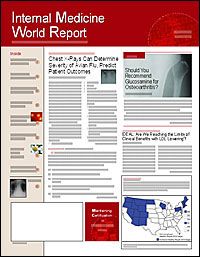Insomnia Medications for Older Adults: A Double-Edged Solution?
Sleep can elude older adults, often resulting in impaired daytime functioning and poorer quality of life. When older patients complain to their physicians about insomnia, they are frequently prescribed benzodiazepine-type sleep medications. Investigators led by PhD candidate Jennifer Glass from the University of Toronto, Ontario, Canada, decided to compare the benefits derived from such hypnotic sleep aids with the risks inherent in their use (BMJ.?2005;331: 1169-1173).
Data for the study were collected from published randomized, controlled trials (1966-2003) of any pharmacologic treatment for insomnia given to adults aged >=60 years for 5 consecutive nights. Manu?facturers of newer benzodiazepine receptor agonists were asked about unpublished studies as well. Some 24 studies involving 2417 individuals met the selection criteria.
Benefits measured were sleep quality, total sleep time, and sleep-onset latency or ease of getting to sleep. Side effects measured included cognitive adverse events (ie, memory loss, confusion, disorientation), psychomotor events (ie, dizziness, loss of balance, falls), and morning hangover effects. Of the total participants, 830 were treated with a benzodiazepine, 106 with es?zop?iclone (Lunesta), 384 with zolpidem (Ambien), 609 with zaleplon (Sonata), 14 with diphenhydramine (Benadryl), and 468 with placebo.
Compared with placebo, sedative use improved sleep quality (effect size, 0.14; P <.05) and sleep duration (mean, 25.2 min; P <.001) and decreased nighttime awakenings (0.63; P?<.001). However, adverse events occurred far more frequently with sedatives compared with placebo: adverse cognitive events were 4.78 times more common, psychomotor events were 2.61 times more common, and daytime fatigue was 3.82 times more common.
Ms. Glass and her fellow investigators stress that although improvements in sleep quality with sedative use are statistically significant, the magnitude of effect is small, and the risk of adverse events far outweighs any benefits in a population al?rea?dy prone to falls and ?cognitive impairment.?
The investigators noted that non?pharmacologic interventions, such as cog?nitive behavior therapy, could be as efficacious in healthy patients aged >60 years and should be considered in those who are free of cognitive impairment.?
The most recently approved sleep ?medication, ramelteon (Rozerem), may be a good option for some patients, since its new mechanism of action does not involve sedation (for more information on this drug see IMWR, December 2005, page 19).
